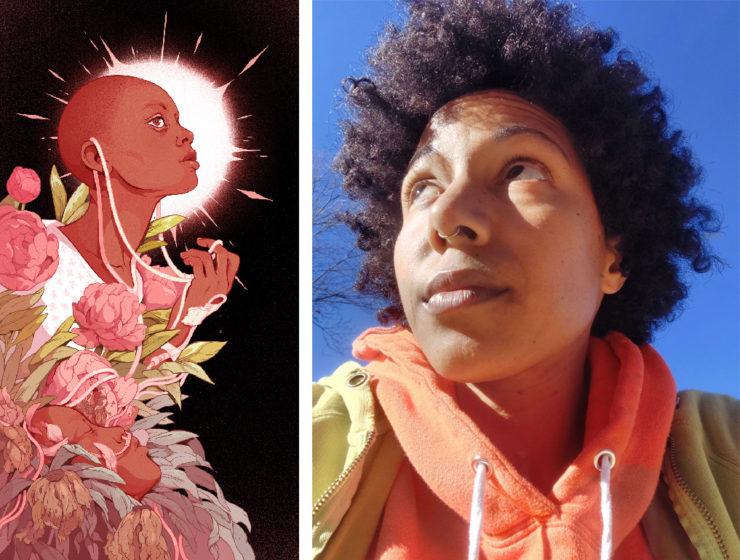Is there anything more exciting than a new voice in fiction? (Spoiler alert: NOPE.)
We asked the three finalists of the LeVar Burton Reads Writing Contest a few questions about their writing processes and favorite books. Here we’re pleased to present a brief interview with Vivianni Glass. Check out her story “Synthetic Perennial” here!
How does a story start for you—with an image, an idea, a line of dialogue that pops into your head, or some other way?
It generally starts with curiosity. I have a kid, and I would argue that the impulse to chase something down ‘just cuz’ likely lives nestled between the need for food and housing on Maslow’s hierarchy. A lot of the time, that intense drive to see what happens lives in the stomach of my creative process.
All three of your stories include great worldbuilding. While AnaMaria Curtis creates an entire fantasy world, you and Grace P. Fong both use smaller details to skew a more recognizable reality. How did you each decide which details to leave in and which to leave out as you brought your stories to life? Do you have more stories planned in the worlds you created?
The word limit. What I mean is that K’mori, Lillian, and Kenny are loud. They know what they saw, and they have opinions. I’m along for the ride, and the ride is far from over in their story.
Many writers (and storytellers) who I admire describe how world building is largely an act of listening, of trying to adjust your own expectations. There are elements to this process that I just don’t have access to yet. It’s not that I haven’t drawn out plans for a story before or tried crafting an outline. It’s just that it rarely does me much good if I’m writing well. What stays is what is honest to the story.
What was the story or novel (either told or written) that first made you want to be a storyteller?
My kindergarten teacher was a remarkable woman for a myriad of reasons, chief to childhood me being this: That lady could tell a story. She once described a tale where she had been sunbathing in her yard when a squirrel ran up one leg of her pants and then down the other—and let me tell you, it was the absolute height of comedic artistry to little me.
She was an involved storyteller: She read books theatrically and they were wonderful, but she told us stories from her life and that was magic. From that same magic, she encouraged us to tell our stories, even binding our stories together to create a class book once. The experience of seeing my peers’ and my stories as interesting, valuable, worth collecting—well, that is a truth I have invested in.
All of that to say, pay teachers more. That’s my plug.
The contest’s theme was “Origins & Encounters”—what was it about this theme that spoke to you?
I can truthfully say that if Mr. Burton had challenged listeners to write about iced tea, I would have tried. The beauty is that so much of what the LBR podcast creates is an opportunity to encounter other vastly engaging worlds from the economy seat. I think that the theme itself was a wonderful invitation—where do you start, and what happens when we both meet? There’s an enticing amount of accessibility in that theme. I felt a lot of energy at the request to see how our humanity looked standing next to something new.
Building on that, many authors have a personal theme or obsession that animates all of their work. Do you feel you have one? If so, what is it?
I’m really drawn to questing stories. When I was growing up, I inhaled stories about outward quests. In my writing I have the same fixation if slightly inverted: I want to know how people get acquainted with themselves, and what they do with their unknowable pieces. I love our little tensions. I feel an amount of obsession over how we hold mirrors up in our relationships, both intimate and casual; our deep need to triangulate through our social network.
People make culture, and culture evolves like any other living thing. I enjoy the challenge of trying to draw as accurate a portrait of this as I have the skill.
Many authors also feel like their work is in conversation with another work or author—do you have any specific books or writers that you feel you’re speaking with, either in these stories or in your work in general?
These days, I send letters to Octavia Butler, N.K. Jemisin, Kimberly Crenshaw, Nisi Shawl but also quite a few musical artists, and definitely to Bob the Drag Queen. They are largely letters of thanks and admiration at the abundance they cast out before them.
Finally, in the spirit of Reading Rainbow, what book or author would you like to recommend for the kids at home?
Phoolan Devi: Rebel Queen by Claire Fauvel is a fantastic graphic novel I stumbled upon recently, and I would highly recommend it for readers who are looking for creative biographies about remarkable people… Also, Give My Love to the Savages: Stories by Chris Stuck. It burrows into you in the best and most terrible ways. For young children, Don’t Worry, Little Crab! by Chris Haughton, and My Three Best Friends, and Me, Zulay by Cari Best. These books receive the stamp of approval of our little Intergalactic Ambassador, night after night.










